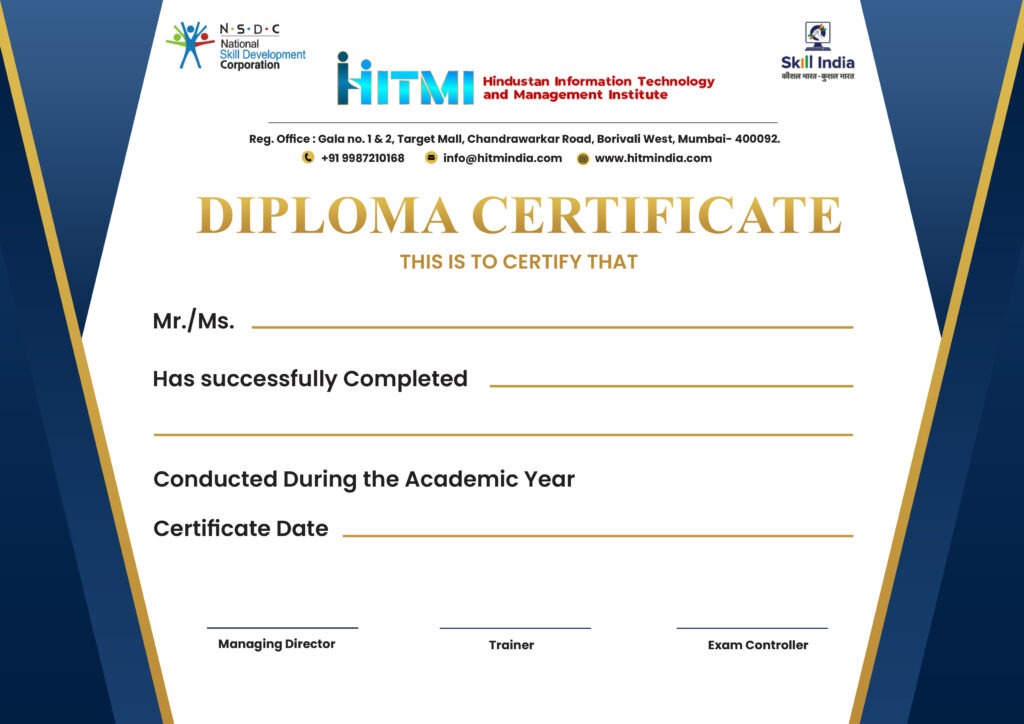- Home
- About Us
- Our Courses
- Data Science
- Machine Learning
- Cyber Security
- Cloud Computing
- Artificial Intelligence
- Become a Partner
- Careers
- Contact Us
- Blog
Enroll in HITMI’s premier Diploma in Digital Marketing to advance your career as a skilled marketer. Through our hands-on training methodology, you’ll acquire expertise in diverse digital marketing strategies and tactics for successful online brand promotion.
Immerse yourself in practical learning through real-world projects, obtain industry-recognized certification, benefit from live mentorship by seasoned professionals, and open doors to a multitude of career prospects within the dynamic realm of digital marketing with HITMI’s comprehensive diploma program. Enquire now to secure your seat!
In this era of digital transformation, the demand for skilled professionals in digital marketing is soaring, creating numerous career prospects for individuals seeking to thrive in this ever-evolving field.
At HITMI, we are committed to providing you with a comprehensive diploma course in digital marketing. Our curriculum covers fundamental areas such as SEO, Social Media Marketing, Google Ads, Content Marketing, and more, positioning you as a standout candidate in today’s competitive market.
Distinguished as the most extensive diploma course in digital marketing in Mumbai, our program encompasses advanced modules not found elsewhere.
With digital marketing becoming increasingly accessible to individuals from all backgrounds, our training is suitable for students, job seekers, freelancers, entrepreneurs, and seasoned marketers looking to elevate their skills.
For those keen on enrolling in our diploma course in digital marketing in Mumbai. Feel free to contact us

Our curriculum is meticulously crafted to encompass a well-structured and comprehensive approach, aligning with the latest trends and adhering strictly to industry standards.

Our program gives you lots of practical skills and knowledge for real-world situations. You'll work on real projects and tasks to learn effectively.

Explore HITMI's commitment to securing your career with us. Take the opportunity to experience our quality training firsthand & gain confidence in our 100% job assurance

Get valuable guidance and unwavering support from experienced mentors who are dedicated to assisting you throughout your journey to success.

Our approach is practical, offering hands-on experience with live, interactive training. This lets you utilize what you learn in real-time situations.

Our emphasis lies in honing practical skills and enhancing real-world capabilities. You'll engage in live projects, crafting a strong portfolio for your future career pursuits.

Upon successfully finishing our course, you'll receive a widely recognized certification, paving the way for numerous career opportunities in India and globally.





Our digital marketing course covers essential skills such as SEO, Social Media Marketing, Google Ads, Content Marketing, and more, enabling you to excel in the ever-evolving digital landscape.
Yes, upon completing our digital marketing training, you will receive a recognized certificate validating your proficiency in the field.
HITMI stands out as the top digital marketing institute in Mumbai, offering comprehensive training and advanced modules not available elsewhere.
Learning digital marketing opens doors to abundant career opportunities and allows you to stay relevant in today’s digital-first world.
Yes, you will receive a recognized certification from HITMI Institute upon successfully completing the Digital Marketing Course.
